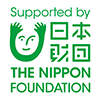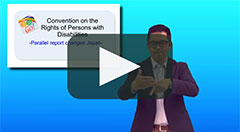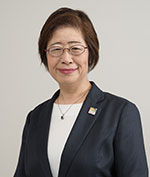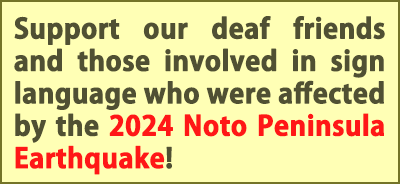
State Parties (Japan) Report and Parallel Report,
Review by the Committee of the Rights of Persons with Disabilities (CRPD)
to Japanese / Japanese Sign Language page

International Sign
(23 min.)
play button to watch
corresponding video chapter
Dec. 2001
Oct. 2003
Dec. 2006
Sep. 2007
Feb. 2014
State Parties’ report
Jun. 2016
Jun. 2019 Lobbying for List of Issues
(LoI) Sep. 2019 LoI by CRPD
Oct. 2019 Respond to LoI, besides the
State Parties Mar. 2021 Written response to LoI from
the State Parties Jun. 2021
Aug. 2022(TBC)
Aug. 2022(TBC) Concluding observations
(recommendations) Sep. 2022(TBC)
| No. | Date | State Parties government | CRPD | DPO |
| 1 | Dec. 2006 | UN GA adopted CRPD | ||
| 2 | Sep. 2007 | Signature of CRPD | ||
| 2 | Feb. 2014 | Ratification of CRPD | ||
| 3 | Jun. 2016 | State Parties Report | ||
| 4 | Jun. 2019 | Parallel report by DPOs | ||
| 5 | Sep. 2019 | Lobbying for List of Issues (LoI) | ||
| 6 | Oct. 2019 | LoI by CRPD | ||
| 7 | Mar. 2021 | Parallel report by DPOs | ||
| 8 | Jun. 2021 | Written response to LoI from the State Parties | ||
| 9 | Mar. 2022 | Parallel report by DPOs | ||
| 10 | Aug. 2022(TBC) | Onsite briefing by DPOs in Geneve | ||
| 11 | Aug. 2022(TBC) | Constructive dialogue | ||
| 12 | Sep. 2022(TBC) | Concluding observations (recommendations) | ||
| 13 | to be confirmed | Implementation of the recommendations by the State Parties | ||

Presenter: Kumiko Nakanishi
view original video in Japanese Sign Language
1. Ratification of CRPD

Chapter 1. Signature and Ratification of CRPD by the Japanese Government
(starts at 00:48)
Transcription:
Here is the process of signature and ratification of CPPD by the Japanese government. As you may know, CRPD was adopted in the United Nations General Assembly by unanimous support of all the participating nations in 2006. The Japanese government signed it in 2007. However, disabled people’s organizations (DPOs) in Japan claimed the government to review the domestic laws, for they are not yet compatible with CRPD. The government started to review the laws.
show more...
In 2011, the Basic Act for Persons with Disabilities of Japan was amended, and it specified the words as “language (including signs)”. It gave an official recognition that spoken Japanese is not a sole language of Japan. With the acknowledgement of ongoing discrimination against persons with disabilities, the Act for Eliminating Discrimination Against People with Disabilities was enacted in 2013. The act states the public administration is obliged to eliminate the discrimination. It was the non-binding obligation for private companies, now it turned to be the obligation.
In 2014, the Japanese government ratified CRPD, for the domestic laws had been ready to be compatible. Ratification is, in other words, a promise made between the Convention and the Japanese government. The government is responsible for reviewing the items and issues which were inquired by the UN Committee.
Since 2010, JFD claims the sign language legislation in Japan, and continues working with it.
show less
2. First reporting by government & First Parallel report by DPOs

Chapter 2. State Parties Report and Parallel Report by DPOs
(starts at 03:20)
Transcription:
I will go on to the overview of the report by the Japanese government and the parallel report developed by DPOs. The Japanese government ratified CRPD in 2014. In the next two years, the government is obliged to review the progress of the organization of the domestic laws and to report it.
show more...
We, the DPOs, also carefully review the government report, to see if the explanation is accurate and correct. When we find the superficial description in the report, we will point it out and report it through parallel report.
In Japan, an assembly of 13 DPOs including JFD, that is, the Japan Disability Forum (JDF), had regular meeting once or twice a month to draft and develop the parallel report. UN Committee of the Rights of Persons with Disabilities (the Committee) thoroughly examines both of the report that the Japanese government submitted and the parallel report that we developed.
show less
3. List of Issues (LoI) by CRPD & Lobbying for LoI

Chapter 3. LoI by CRPD Lobbying during the CRPD session
(starts at 05:13)
Transcription:
I will go on to the List of Issues (LoI) by the Committee, and the lobbying during the session.
What is lobbying? Reaching out to the Committee members. We, the lobbyists, directly contacts and communicate with the Committee members, to inform them of the current situation of the domestic laws which are yet to be fully enhanced, to provide different perspective and assessment from the government report.
show more...
For example, about the issues of the deaf people, education using sign language in deaf schools are instructed by teachers who do not have expertise in sign language, and oralism is still widely adapted. Dispatch system of sign language interpreters and their working conditions have much to be improved. We inform the Committee members of a range of barriers in the access to information. We use Japanese sign language, and it will be translated into spoken English.
After the committee members obtained such information, they check the government report and list up the key points, and submit LoI to the Japanese government, to further ask about these issues. Thus the lobbying plays an imperative role.
Toward the establishment of the sign language act, JFD has also informed the committee members of the needs for the enhancement of our surrounding environment, where sign language is ensured in every area of life, where we can access information at any time and any place, where we can use sign language. The Committee members acknowledged the issue: the Japanese government is yet to fully recognize sign language even after the ratification of CRPD, and they added it to the LoI to the Japanese government.
show less
4. List of Issues (LoI) by CRPD

Chapter 4. LoI by CRPD
(starts at 08:24)
Transcription:
Next, I will go on to the LoI by the Committee.
CRPD has thirty-three articles. In relation to these articles, we submitted a request to the Committee to include issues on sign language in the LoI.
Articles 1 through 4 cover the objectives and definitions in CRPD. Sign language has an equal status with spoken language, and recognized as language. The use of sign language should be ensured in every aspect of living, not just a limited part of it. Not limited to the field of education, labor, and medical care, use of sign language, as a right, should be ensured in every field of our living. This is needed to be a recommendation to the Japanese government- we requested to the Committee members.
show more...
In addition, many hearing people are yet to be familiar with sign language. Sign language has an equal status with spoken language: we need to create more and more opportunities to spread the idea. Sign language is as essential as spoken language is, so we requested to the Committee to include a recommendation that inclusion of sign language is a critical to build a people-friendly environment.
Article 21 states that the freedom of expression and opinion, and access to information should be ensured. In case of emergency, hearing people can access information they need and interact with it at any time and any place, so that they can be less prone to the troubles.
However, deaf people are stumbled to access information, face difficulties in making themselves understood, and their rights are not protected. Every person should be protected and respected on an equal basis, regardless the individual is hearing or not, thus the freedom of expression should be protected. So is the access to information.
For instance, when we use public transportation such as Japan Railway, bus, and airplane, we need to process a lot of information. When we come across accidents, and the related information flows in. We need to obtain the information without flaws, and understand what is says. We never know what happened as long as the access to information is stumbled. We will be left behind from the hearing people.
Home appliances are often designed solely for hearing clients, failing to include deaf clients. Deaf clients are not their priority, and this often happens to people with different disabilities. Freedom of expression should embrace every person with disabilities. So we requested to the Committee to include recommendation to organize the laws, to the Japanese government.
show less
5. Written response to LoI from the State Parties

Chapter 5. Response to LoI from the State Parties
(starts at 12:56)
Transcription:
Now I will go on to the response of the Japanese government to the LoI. The Committee inquired the government what the procedure of an official inclusion of sign language into an article of a law on a national level. The government replied with two instances.
First, the government states the Basic Act for Persons with Disabilities was amended in 2011 so as to include sign language in languages. And the government says they are under preparation with an aim to guarantee the measures for communication and to provide its options to all the people with disabilities.
show more...
Second, the sign language act is yet to be established, but an enactment of sign language ordinance by local government preceded, initiated by Tottori Prefecture in 2013. Until now, nearly 400 ordinances were enacted throughout the country. Local governments are positive in enacting their sign language ordinances, but it is the government’s task to enact the national sign language act. The government is, however, convinced that the job is done once the local government perform for the implementation of their ordinances. The government is yet to be determined to enact the sign language act, and in the reply to the Committee, only refers to sign language ordinances organized by local governments.
show less
6. Second, Third Parallel report by DPOs

Chapter 6. Parallel report No.2
(starts at 15:16)
Transcription:
Parallel Report No. 2 – In 2019, JDF submitted our first parallel report to the Committee. Later, the Committee sent the LoI to the Japanese government, and they sent their reply. Then the constructive dialogue between the Committee and the Japanese government was scheduled in 2020, but it has been postponed due to the COVID-19 pandemic, as you know. The pandemic also revealed the failure and deficiency in the organization of the legislations, and we added our findings in our second parallel report.
show more...
Here are the items and issues we are hoping that the Committee recommends to the Japanese government: First, the enactment of the sign language act is essential, to ensure we can use and access in sign language without restraint in any areas of our living. Second, the sign language act will lead hearing people, particularly parents with deaf children and their educators to the appropriate understanding of deaf people and sign language.
Our parallel report includes the issues on sign language interpreters- their training, placement, and dispatch. Sign language interpretation, including consultancy in sign language, should be accessible 24/365, so that deaf people can safely sustain their living.
We would like the Committee to recommend to the Japanese government to organize such environment, so we included this issue in our second parallel report. Through the discussion after discussion by the JDF members, the opinions and ideas of the DPOs were organized and finally resulted in the parallel report.
show less
7. Constructive dialogue

Chapter 7. Constructive Dialogue between the CRPD and the State Parties
(starts at 18:08)
Transcription:
Constructive Dialogue between the Committee and the Japanese Government – The constructive dialogue, which was supposed to be held two years ago, has been postponed due to the COVID-19 pandemic. We were eager to know the new schedule. Now the constructive dialogue was rescheduled to August to September 2022, and will be held in Geneva, Switzerland. We are going to the lobbying.
show more...
Some of the replies by the Japanese government did not convince us, and we will provide information to the Committee members about the undeveloped legal system. We are going to work on the Committee members to recommend the Japanese government on the enactment of the Sign Language Act and the Access to Information and Communication Act. We will work hard and lobby, for the protection of the life of deaf people, from children to seniors.
show less
8. Concluding observations (recommendations)

Chapter 8. Concluding observations (recommendation) by CRPD
(starts at 20:05)
Transcription:
Concluding Observations by the Committee – Recommendation to the Japanese government
When the Sign Language Act and the Access to Information and Communication Act is successfully included in the recommendation, our mission is completed? – No, it isn’t. The Japanese government is responsible for accepting the recommendation, and organizing the laws.
show more...
In the next round for the CRPD review, we are also demanded to identify new issues and lead them into the solution. When society see its changes, new issues will be emergent. For instance – how about COVID-19? Before and after the pandemic, so many things have changed, and these changes brought many issues. For example, there were some cases that deaf people are refused to be admitted to a hospital during the pandemic, for there were no medical doctors nor nurses who know sign language and they were not able to communicate with deaf patients. Deaf people are left vulnerable. Their health and life are not fully protected. The review of the laws is the must.
As situation changes, new issues and challenges emerge. Organization of the legal system is essential for the solution of such issues and challenges. The laws should be amended each time they face the new issues. JFD collect your voices, demand the government to organize the laws, and lobbies to the Committee. JDF also collect voices of the DPOs, bind the ideas, be united, and lobbies to the government and the Committee.
show less
News on our efforts concerning the Convention on Persons with Disabilities
- Activity Report of the UN CRPD (August 2025) December 5, 2025
- Activity Report of the UN CRPD October 9, 2025)
- Activity Report of the UN CRPD – COSP18 and Side Events September 5, 2025
- 7th UN Ad Hoc Committee Meeting on the “Conventions for Persons with Disabilities” – New York March 1, 2006
- Reconfirming the Significance of an International Convention on Disability September 1, 2004
- Recent movements related to the UN Adhoc Committee Working Group draft of the Convention on Persons with Disabilities April 1, 2004
- Report by Eiichi Takada on the Regional Workshop towards a Comprehensive and Integral International Conventionon Protection and Promotion of the Rights and Dignity of Persons with Disabilities November 1, 2003
- UNESCAP Moving Forward Toward the Realization of An International Convention on the Rights of Persons with Disabilities July 1, 2003
- “Report from Japan” by WFD Board Member Eiichi Takada June 10, 2003



